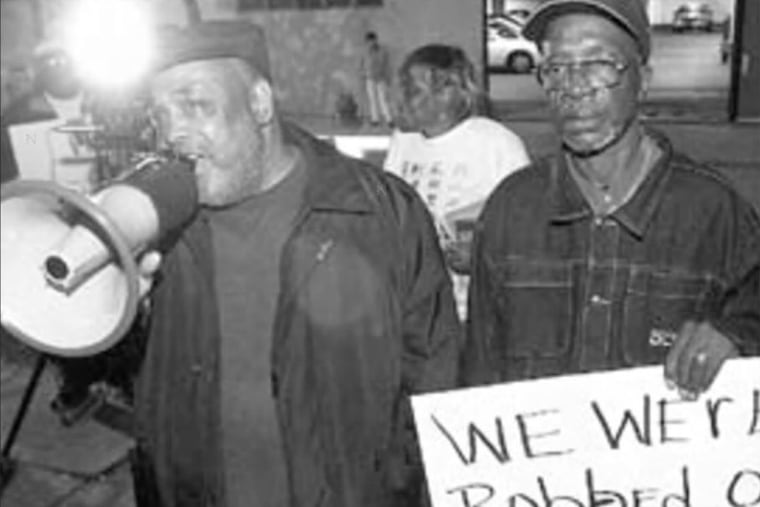Leodus Jones, 74, bore witness to Philly’s grisly Holmesburg prison experiments
Leodus Jones bore witness to the infamous Holmesburg Prison experiments, in which doctors exposed inmates to everything from dioxin to LSD.

Philadelphia’s history includes many dark corners, and Leodus Jones bore witness to one of them: the infamous Holmesburg Prison experiments, in which doctors exposed inmates to everything from dioxin to LSD.
Mr. Jones, of North Philadelphia, never stopped speaking out about the harm done there, and bore the scars up until his death on Jan. 21 at age 74.
Though he had receded from public life in recent years, Mr. Jones beat a path from crime to activism that many others have followed, said Wayne Jacobs, executive director of an organization called X-Offenders for Community Empowerment.
"Leodus was a forerunner in terms of people with convictions becoming community leaders," he said. "He set the path."
Jacobs met Mr. Jones first when they were low-level criminals, and again in prison; Mr. Jones was there on charges of receiving stolen property. They reconnected in the Holmesburg law clinic where Mr. Jones was a mentor to other inmates.
"He was in there teaching people the law. In jail you can't trust everybody, but it was like he had a mark on his forehead: 'Come to me. I'll help you.' "
After Mr. Jones was released, he launched an organization, Community Assistance for Prisoners, that advocated around issues including police brutality, the treatment of inmates with serious mental health issues, and the creation of jobs for ex-offenders.
By 1974, he was one of six black community leaders on an "anticrime crusade" that raised calls for more diversity in the police force, opportunities for city kids, and life sentences for "hard drug pushers." It reportedly landed him on a kill list created by the Black Mafia. Then, he dropped out of the crusade, telling the public that the effort was too closely aligned with Mayor Frank Rizzo for his comfort.
One cause he never set aside was justice for inmates at Holmesburg who participated in dangerous medical trials, a scandal exposed by author Allen Hornblum in his 1998 book, Acres of Skin. Hornblum ran a literacy program in the prison. "The first day there I walked in to scores of inmates wrapped with adhesive bandages, gauze and medical tape. I thought maybe it was a knife fight on the cell block. The guard chuckled and said, 'They're just the perfume experiments for the University of Pennsylvania.' "
In researching the book, he met Mr. Jones, who said the skin on his torso looked "like a pinto pony" as a result of the experiments. "I didn't care at the time. I needed the money," Mr. Jones once told a reporter. For one experiment, he was told he was being injected with a rare disease from India and paid $10, with a $5 bonus when he developed an abscess.
"He was canny enough and smart enough to recognize something untoward was taking place that probably shouldn't be. In fact, he probably put himself in a little bit of a mid-20th-century history in that he was one of two inmates from Philadelphia who testified in Washington in front of Ted Kennedy's health committee subsequent to the revelations of the Tuskegee syphilis study." (In that experiment, doctors let hundreds of black men suffering from syphilis go untreated for 40 years.)
"He testified, and practice of using inmates for experiments was banned," said Angus Love, executive director of the Pennsylvania Institutional Law Project. "Now, as time goes on, things have changed. Because people dying of cancer want to use experimental drugs as a last-ditch effort, there's a movement to allow experiments again. It's come full circle."
Mr. Jones was one of the only Holmesburg inmates to successfully sue, receiving a $40,000 settlement. His subsequent effort to organize inmates for broader legal action fell apart.
Later, he ran voter-registration efforts inside the Philadelphia jails, even trying to bring in candidates to meet with inmates, and was a board member of the Pennsylvania Institutional Law Project.
He had three children, his youngest daughter, Tabatha Jones, said. For the past 10 or 20 years, he had slowed down, and his death followed a long illness. But she said he never stopped talking about what had happened at Holmesburg, or being there when his community needed him.
“There will never be another one like that,” she said. “Can you put this in all caps for me? One word, if I thought about it, that I could sum him up to be: PRESENCE. He was a presence. A presence and a voice.”